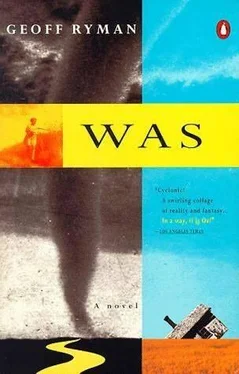The people who left the land came to the cities not to get jobs, but to be free from them, not to get work but to be entertained, not to be masters but to be charges. They followed yellow brick roads to emerald cities presided over by imaginary wizards who would permit them to live in happy adolescence for the rest of their lives… It is this adolescent city culture, created out of the desperate needs and fantasies of people fleeing from the traps and tragedies of late nineteenth century country life, that still inspires us seventy years later. -Michael Lesy, Wisconsin Death Trip
Kansas was a go-ahead place. It had been the first territory in the United States to propose votes for women-in 1859. It was to be the second state to grant them, nearly thirty years later.
Prohibition was a women's crusade. Women couldn't vote, but they organized and lobbied; and an amendment to the state constitution forbidding the sale and manufacture of intoxicants was passed by a narrow margin in 1880. The state became dry, as far as could be managed with towns full of hot and sweaty men. The local newspapers ruefully reported that the most popular local song was "Little Brown Jug" and that kegs were seen going to private parties. Women raided pharmacies that were too free with their medicinal alcohol.
Manhattan was a center of progress in the go-ahead state. The town had its first telephone in 1877, wired up by Professor Kedrie of the State Agricultural College. Professor Mudge had died, and there was talk of erecting a statue to his memory. Barbed wire arrived, Devil's grass. It finally put an end to the question of the herd laws by ripping the flesh of cattle that tried to wander into farmers' fields. No less a personage than G. W. Higinbotham was severely wounded by barbed wire, which tore out a chunk of his chest.
In 1878, Manhattan built a fine new schoolhouse of stone. It towered above Poyntz Avenue, two stone floors with a stone tower. It had four main classrooms on each floor to accommodate the growing numbers of little scholars.
Aunty Em's instinct was to send Dorothy to the new Manhattan school. But Aunty Em did not approve of the school's Principal, Mr. J. McBride. It was a matter of public record, jovially reported in the local press, that he was fond of drink. He was succeeded by Professor Hungerford, but this was no improvement. Professor Hungerford was considered to be the local actor and singer. Aunty Em did not approve of actors. He had quite taken over her own Congregationalist church. In May of 1880, the church had staged an opera, The Cantata of Joseph , with full orchestra and sixty costumes. Professor Hungerford took the leading role. The Independent reviewed the production and called him, particularly, "brilliant."
"Brilliant indeed, like his hair," said Aunty Em quite mysteriously. "In time the people of Riley County will tire of all this old crony-ism."
So Dorothy stayed for a while in Schoolhouse Number 43, called Sunflower School. She was quietly content there. This was not enough for either Aunty Em or the teacher of the school, Miss Ida Francis.
Ida Francis and Emma had become firm friends. Miss Francis was a regular caller to tea, which she drank sitting at the Gulches' one rickety table, little finger outstretched as if the place were grand. She could pour her heart out to Emma Gulch.
"They have finally, finally repaired the stove," Miss Francis said once, eating Aunty Em's biliously colored cornbread. "The poor little scholars are not being introduced to smoking via the school chimney any longer."
"We must be grateful for that," said Aunty Em with a chuckle. "The next thing is to do something about the books."
"I must say again, Mrs. Gulch, how grateful we are for your donation."
"I do what I can," said Aunty Em, smiling, with her eyes closed.
"Would that Squire Aiken took such an interest."
Squire Aiken lived on the slopes of the hill south of the river, on the wooded side. He had peach orchards. His family had settled there from Kentucky. His family had been slave-staters.
"Are you surprised, with that background?" murmured Aunty Em, eyebrow raised.
"Hmmm," said Miss Francis, without commitment. Aunty Em did not know that Miss Francis's parents had favored the South.
"And how is my dear little charge progressing?" said Aunty Em, gazing on Dorothy with fondness.
It was the moment Dorothy dreaded. The bilious cornbread went round and round in her mouth. It was supposed to be a treat, to have tea with Miss Francis.
"Well," said Miss Francis looking around, pressing down a smile. ''Everything Dorothy does is as neat as wax."
"You should see her at her chores," said Aunty Em, nodding.
"All her work is quite brilliantly presented," said Miss Francis, "but it must be said that the content of her figure work and ciphering is not what it should be."
"Dorothy, are you paying mind to your teacher?"
"Yes, Mmm," whispered Dorothy.
"Speak up, Dorothy," said Aunty Em. "Sit up straight, and pay Miss Francis the compliment of your regard." She turned back to her ally.
"Dorothy is always beautifully behaved, a very model in all respects," said Miss Francis, still smiling at Dorothy. "Except one. She is still stone silent. She does not put herself forward. Nor does she appear to fraternize with the other children."
"Even now," sighed Aunty Em, looking at the table in sadness and concern. "It is the tragedy, hanging over her."
Dorothy was so weary of being reminded of her tragedy. She did not remember it. It was a universe ago. She did not remember the old house, she sometimes forgot she had once had a little brother, and her mother was the flattest and dimmest of memories. She had long ago given up dreaming that her father might come for her one day and take her away. Her father didn't know or care. It came as something of a surprise to remember that he was still alive, Dorothy had grown so used to telling everyone that he was dead. The tragedy, as Aunty Em called it, seemed to have nothing to do with her.
"Perhaps also," said Aunty Em, "it is that the other children do not wish to mix with her."
Aunty Em was coming to blame the rough local children of Zeandale. They ran barefoot in the dust and stole fruit from orchards and raided wildlife by the river. All sorts of mischief, while her Dorothy sat at home and polished and sewed and scrubbed and grew beautifully less.
Then Professor Hungerford left teaching to take advantage of all his many connections. He opened a business, offering abstraction and insurance. Aunty Em's loyalty to Miss Francis persisted for two years. Dorothy sat in the kitchen silent and still, sinking even deeper into a scholastic quagmire. Aunty Em felt compelled to ask Miss Francis to dinner.
Aunty Em told Miss Francis that something had to be done about Dorothy before it was too late. It was no reflection whatsoever on Miss Francis's program, but it was time that the child was given a different and more varied setting. With Professor Lantz now in charge, and Mrs. DeEtta Warren as his assistant, Aunty Em now had renewed confidence in Manhattan education. Miss Francis could do nothing but concur and skillfully manage to disguise a measure of relief.
So, though Zeandale now had a stone schoolhouse as well, Emma Gulch sent her quiet little mouse of a ward all the way to Manhattan rather than have her educated in the country. This was considered by the other farmers to be of a piece with the rest of her behavior.
It fell to Henry Gulch to take her in. All through the autumn of 1881, he and Dorothy would be up with the dawn. Through the long gentle ride to Manhattan, they would see the sun rise on fields and in forest. They would see the birds, though Uncle Henry would not insist on Dorothy naming them. He would let the birds be themselves. He let Dorothy be as quiet as she wanted to be, finally resting from work, her books in a bundle in the back, out of her arms. Often she fell asleep, leaning against him, listening to the plod of the horse's hooves in the dust.
Читать дальше












